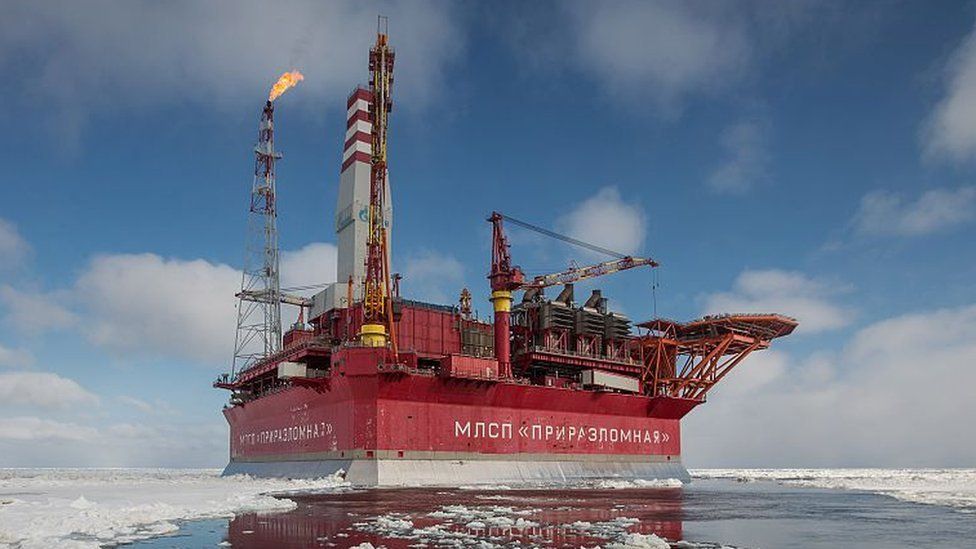Ukraine war: Russian energy embargo needed now, says finance minister
- Published

A full embargo on Russian energy is needed now, Ukraine's finance minister has told the BBC.
Sergeii Marchenko said although he did not think it would necessarily end the war, it would make it harder for Russia "to finance their military needs".
He said the invasion of Ukraine had pushed up energy prices, tipping the scales in Moscow's favour.
It comes as the European Union tries to reach agreement on a full ban on imports of Russian oil.
The bloc has already pledged to reduce gas imports by two-thirds by the end of 2022.
Mr Marchenko said: "Huge oil and gas prices help Russia to receive additional amounts to make their budget run with a surplus. In comparison we are running [the country] with very huge deficit [in] our budget."
"I believe that [a] full embargo can make Russia suffer more than it is right now," he added.
About 40% of EU gas imports and 27% of oil imports come from Russia.
The bloc's politicians are trying to balance their desire to support Ukraine with the needs of their energy hungry citizens and businesses.
On Friday European Commission President Ursula von der Leyen admitted it was "not easy to establish unity" amongst the 27 members but added that she was "confident" an oil embargo could be agreed.
Even before the war, last year's increase in prices meant oil and gas revenues accounted for 36%, or $119bn, of the spending of Russian President Vladimir Putin's government.
However this could increase significantly, to more than $180bn, despite big production cuts by Russia - the world's third biggest oil producer - according to the consultancy Rystad Energy.
In comparison Ukraine's economy is forecast to shrink 45% this year because of the conflict, according to the World Bank.
Mr Marchenko said the war meant his country was collecting less in taxes "because more than 20% of our businesses are fully closed".
"It means that we can't manage to fulfil our necessary duty as [a] government without international support, or without just printing money," he added.
Watch: Ros Atkins on...Russian gas and oil
Another reason Ukraine's economy is struggling to support itself is because of the sharp fall in commodity exports. Before the war it was one of the world's top producers of crops such as sunflower, corn and wheat but it is now a lot more difficult to earn money by selling those to the rest of the world.
Russia now controls the majority of Ukraine's port cities and with the country's harbours blocked off an increasing amount of what it can still export is leaving by trains, which have a smaller capacity.
"The key question for us is how to unblock the seaports of Ukraine," Mr Marchenko said.
Doing so could help reduce soaring global food prices by increasing supplies.
The fall in Ukraine's agricultural exports is "a big source of concern for a number of countries", according to Odile Renaud-Basso, who is President of the European Bank for Reconstruction and Development (EBRD).
The economic development body is trying to support Ukraine's farmers as well as other countries that rely on their produce, she said.
"The more we keep economic infrastructure, equipment businesses afloat, the less the cost will be later on. So I think this is why we need to act now and not only wait for the reconstruction," she added.
The bank was already investing around $1bn a year before the war to help develop Ukraine's economy. With shareholder backing "we would be ready to increase it" to help with rebuilding things such as destroyed roads, bridges and buildings, Ms Renaud-Basso said.
Ukraine's government estimates $600bn of damage has been done so far. The EBRD president said external support, grants and loans would be needed to rebuild the country, similar to what happened in Europe after World War Two.
Work on how to do that has already started, she added.
Ukraine is calling for Russia to foot the bill and Ms Renaud-Basso said "this debate will have to take place". But she cautioned lessons from the end of World War One need to be heeded.
"It had a very strong impact on Germany, and was one of the origins of what came with Hitler. I think that, for Europeans, this is part of the memory and we need to keep that in mind," she said.
You can watch Sergeii Marchenko and Odile Renaud-Basso's interviews on Talking Business with Aaron Heslehurst this weekend.
Viewers in the UK can watch the show on BBC iPlayer.
In other countries, it will be on BBC World News on Saturday at 23:30 GMT, Sunday at 05:30 and 16:30 GMT and Monday at 16:30 GMT.
- Published4 May 2022
- Published14 April 2022
- Published10 April 2022
- Published26 January 2023
- Published14 April 2022